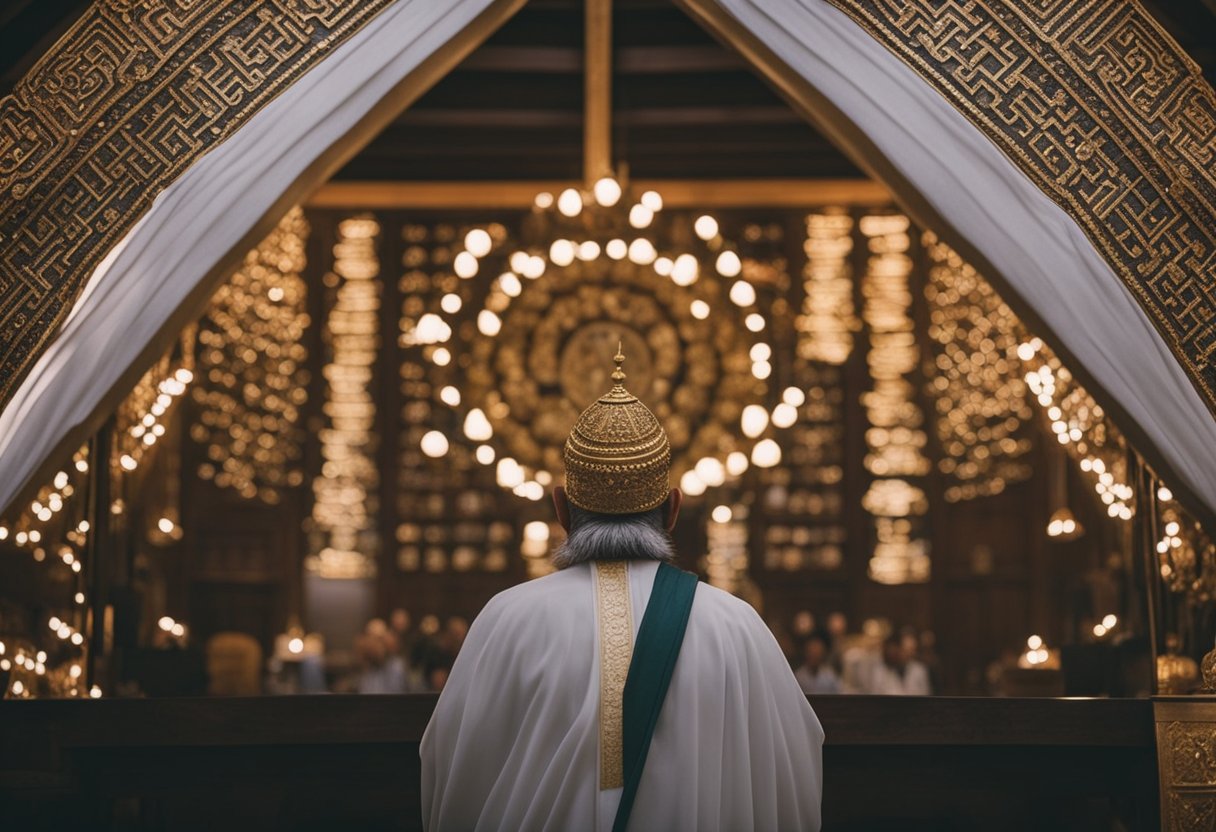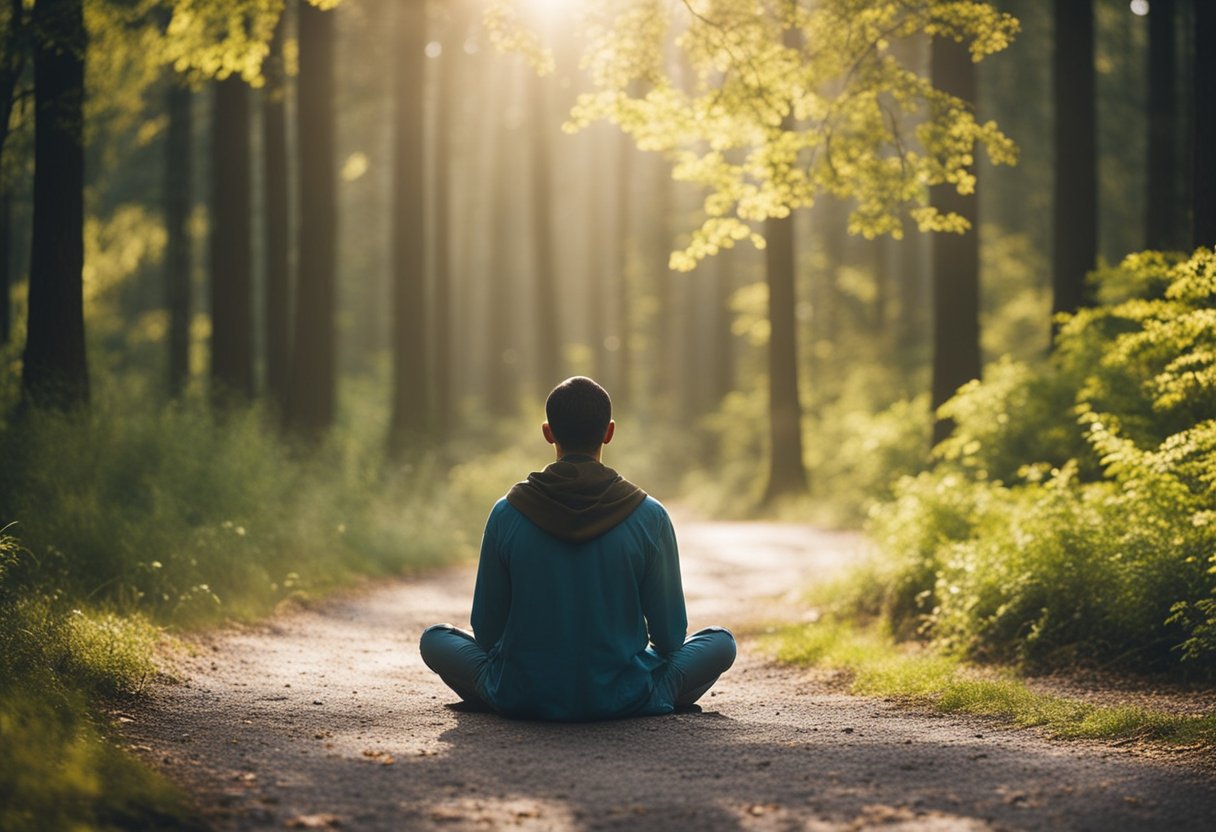Daily spirituality routines can greatly enhance our overall well-being and quality of life. By intentionally setting aside time for spiritual practices, we become more attuned to our inner voice, feel more at peace with ourselves, and develop a stronger understanding of our true purpose. Adopting faith practices can help us navigate through challenging times and allow us to remain grounded in the face of adversity. By incorporating these spiritual habits into our everyday lives, we are able to foster self-awareness, resilience, and a profound sense of inner peace.
Key Takeaways
- Incorporating spirituality into daily routines encourages personal growth and a sense of meaning
- Practicing daily faith allows for increased resilience and peace in times of adversity
- Mindfulness is an essential component of spiritual practices, fostering self-awareness and connection to the world around us.
Daily Spirituality and Its Meaning
Everyday spirituality is about finding meaning and purpose in our daily lives. It’s about connecting with something larger than ourselves, whether we call it a higher power, the universe, or even just our own sense of wonder and appreciation. What I’ve found is that there are many ways to incorporate spirituality into daily routines, and it’s not limited to religious practices.
For me, embracing everyday spirituality means becoming more aware of the present moment and appreciating the beauty of seemingly mundane experiences. It’s about finding gratitude for the gifts life has given us and recognizing the interconnectedness of all things.
Incorporating everyday spirituality into my life has also given me a sense of grounding and balance. It has helped me to cultivate a deeper connection with my faith, which has provided me with guidance and comfort during challenging times. By developing a regular practice of mindfulness and reflection, I’ve been able to tap into an inner source of wisdom and resilience that strengthens my overall well-being.
At its core, everyday spirituality is about nurturing an ongoing relationship with a higher power and finding ways to express our values and beliefs through day-to-day life. This doesn’t have to be a complex process; it can be as simple as taking a few moments each day to reflect on our thoughts, emotions, and actions, or seeking out opportunities to serve others in our community or the world. By making time for these meaningful activities, we can foster a deeper sense of inner peace, self-awareness, and personal growth.
In conclusion, incorporating spirituality into daily routines is an essential practice for maintaining a healthy, balanced life, and it can be done in ways that align with our values, beliefs, and personal experiences. By embracing everyday spirituality, we can enrich our lives with greater meaning, connection, and overall well-being.
Incorporating Spirituality into Daily Routines
Incorporating spirituality into my daily life has been a transformative experience. I have found that with some simple daily practices, I can maintain a greater sense of inner peace, clarity, and connection with my higher power. Here are some tips on how to do just that.
Daily spiritual practices: One of the most helpful things I have done is to establish a routine of daily spiritual practices. My routine typically includes meditation, prayer, affirmation, and reading spiritual texts. These practices help me to remain centered and connected with my source throughout the day.
Practice mindfulness: Being mindful is an essential part of integrating spirituality into my life. This means being present and fully aware of my thoughts, feelings, and actions in each moment. By practicing mindfulness, I am better able to recognize when I might be acting out of anger, fear, or any other emotional state that can take me away from my spiritual center.
Incorporating spirituality into work: Even my work life can be an opportunity for spiritual growth. I try to approach my tasks with a sense of purpose and dedication, seeing them as opportunities to serve others and myself. When I encounter challenges, I do my best to respond with compassion and understanding rather than stress or frustration.
Spiritual walks: Walking is a simple yet powerful way to incorporate spirituality into my everyday life. I try to take a walk each day, using this time to reflect on my feelings, thoughts, and experiences while connecting with the beauty of nature.
Finding rest and renewal: Rest is another important aspect of maintaining a balanced spiritual life. I make sure to prioritize self-care by setting aside time each day to rest and renew both my body and spirit. This may include activities such as taking a warm bath, reading for leisure, or engaging in creative pursuits.
Incorporating spirituality into my daily routines has helped me to cultivate a deeper sense of connection with my higher power and to live my life with a greater sense of purpose and meaning. I encourage you to explore your own spiritual practices and discover what works best for you.
Significance of Faith Practices
As a person who values spirituality, I find that incorporating faith practices into my daily routine significantly impacts my life. In this section, we will explore the role of faith in personal life, the power of prayer, spiritual reading, observance of the Sabbath, and the importance of fasting.
Role of Faith in Personal Life
For me, faith serves as the foundation of my spiritual journey. It provides meaning and purpose to my life and strengthens my relationship with God. Being part of a spiritual community, like a church, helps me to grow in my faith, establish connections with others, and participate in acts of service. These practices foster compassion and love, not only towards God, but also towards others around me.
The Power of Prayer
Prayer is an essential aspect of my daily life. It enables me to maintain a strong connection with God, share my thoughts, feelings, and desires, and seek guidance and strength. I believe that the power of prayer lies in its ability to foster a deeper relationship with God and bring more peace, clarity, and understanding into my life.
Spiritual Reading and Its Benefits
Incorporating spiritual reading into my daily routine has numerous benefits. I find it enlightening and inspiring to dive into scriptures like the Psalms or engage in Bible reading. These practices not only encourage personal reflection, but also enable me to gain wisdom, discernment, and a better understanding of my spiritual journey.
Observance of Sabbath and Its Importance
For me, observing the Sabbath is essential to maintaining a healthy spiritual life. It provides an opportunity to rest, worship, and connect with my spiritual community. By setting aside a specific day each week for these practices, I am able to honor God and focus on what truly matters in life.
The Value of Fasting in Spiritual Growth
Fasting is another discipline that I find valuable in my spiritual growth. By abstaining from food, drink, or other activities, I am able to focus solely on my relationship with God and engage in deeper prayer. This practice not only demonstrates discipline and commitment to God, but also promotes health and well-being.
By incorporating these faith practices into my daily routine, I am able to enhance my spiritual life, foster meaningful relationships, and grow in my connection with God and others.
Understanding and Practicing Mindfulness

Incorporating spirituality into our daily routines can have numerous positive benefits for our well-being. Cultivating mindfulness is a key component, allowing us to be present in the moment and connect with our inner selves.
Role of Meditation in Spiritual Growth
As I’ve experienced, meditation plays a fundamental role in spiritual growth. It allows me to quiet my mind and tap into a deeper state of consciousness. By setting aside time each day for meditation, I find comfort and solace in the stillness. Through this practice, I can gain a greater understanding of my emotions and thoughts, helping me foster a strong connection with my spiritual self.
- Positive benefits: Inner peace, self-awareness, stress reduction
- How to practice: Sit comfortably, focus on your breath, and observe thoughts without judgment
Benefits of Yoga in Daily Life
Yoga is another practice that enriches my spiritual growth and well-being. It combines physical postures, breath control, and meditation, helping me achieve balance and harmony in both body and mind. Practicing yoga regularly has not only improved my physical health but also amplified my mental clarity.
- Positive benefits: Strength, flexibility, mental clarity, emotional balance
- How to practice: Attend classes or follow online tutorials, incorporating various yoga styles and poses
Finding Peace in Nature
Nature has a unique ability to evoke feelings of peace and serenity. For me, spending time outdoors amidst natural surroundings promotes mindfulness and a sense of unity with the world. Whether I’m going for a walk or simply sitting in a park, immersing myself in nature brings comfort and allows me to connect with my spiritual side.
- Positive benefits: Relaxation, stress relief, increased appreciation for the environment
- How to practice: Incorporate regular nature walks, engage in outdoor activities, or create a calming outdoor space at home
Physical Health and Spirituality
Lastly, maintaining physical health is crucial for spiritual growth. I have found that by taking care of my body, I create a strong foundation for my spiritual practice. Engaging in regular exercise, following a nutritious diet, and prioritizing sleep all contribute to my overall well-being, making it easier to dive deeper into my spiritual journey.
- Positive benefits: Increased energy, improved mood, enabler for spiritual growth
- How to practice: Adopt a balanced lifestyle, set achievable goals, and ensure consistency in routines
By incorporating mindful practices like meditation, yoga, nature walks, and a focus on health, I’ve been able to enrich my spiritual life and reap the benefits of a more balanced and meaningful existence.
Spiritual Traditions across Religions

Christianity and Its Traditions
In my journey to explore spirituality, I’ve encountered the rich traditions within Christianity. At the heart of Christian spiritual practices is the belief in Jesus Christ as the Son of God and the teachings of the church. Many Christians follow traditional religious laws, such as the Ten Commandments, as a guide for their everyday life.
Prayer is a central spiritual practice in Christianity, often conducted individually or collectively during worship services. Encouraging spiritual growth and connection with God, many Christians also engage in Bible study and participate in community service as expressions of their faith.
Understanding Buddhism and Its Practices
Buddhism has caught my attention as an interesting spiritual path that focuses on attaining inner peace and enlightenment. Central to Buddhism are the teachings of the Buddha, who emphasized compassion, meditation, and mindfulness as key spiritual practices. Followers are encouraged to develop kindness towards others and themselves.
An essential aspect of Buddhist spiritual life is meditation, which cultivates mindfulness and awareness. In addition to meditation, Buddhists practice ethical conduct and cultivate wisdom in their daily lives to achieve spiritual growth.
Islamic Traditions and Practices
During my exploration of Islam, I’ve discovered the essential elements of its spiritual practices. Fasting and prayer are vital elements in the lives of Muslims, with the goal of building a closer relationship with Allah.
The core spiritual customs within Islam revolve around the Five Pillars – the declaration of faith, prayer, almsgiving, fasting during the month of Ramadan, and pilgrimage to Mecca. These practices are the foundation of a Muslim’s spiritual disciplines, intertwining with daily routines to promote a spiritually-rich life.
Impact of Spiritual Practices on Personal Development

Navigating Relationships with Spirituality
As I incorporate spirituality into my daily routine, I notice its effects on my relationships and connections with others. By acknowledging the presence of spiritual truths, I become more compassionate and understanding towards my friends and family members. Spirituality helps me let go of negativity and anger, fostering positive experiences in my life and in the lives of those around me. This is particularly beneficial in building meaningful friendships that are rooted in patience, forgiveness, and gratitude.
Spirituality and Emotional Well-being
My emotional well-being is also significantly impacted by my daily spiritual practices. Adopting a routine of mindful meditation, prayer, or contemplation allows me to tap into a deeper sense of self-awareness and inner peace. This, in turn, promotes resilience and better emotional regulation. As I practice spirituality on a daily basis, I’m able to increase my capacity for empathy and develop the skills needed to navigate life’s challenges with grace and understanding.
Spirituality and Personal Growth
One of the most transformative aspects of my daily spiritual journey has been the effect it has on my personal growth and character development. Engaging in regular spiritual practices provides me the opportunity to reflect on my actions, examine my values, and reaffirm my dedication to living authentically. By doing so, I gain a renewed sense of purpose and motivation to continue seeking growth and transformation. As my spiritual understanding deepens, I find that my experiences, both positive and negative, serve as valuable learning opportunities, allowing me to evolve into a more compassionate, resilient, and wise individual.
Overcoming Obstacles in Spiritual Journey

As I embarked on my spiritual journey, I faced various obstacles that tried to hinder my progress. However, I soon realized that every challenge is an opportunity for growth and a deeper understanding of my faith. With a confident and knowledgeable mindset, I tackled these obstacles head-on and found ways to overcome them.
One of the main challenges I encountered was feeling lost during the transformation process. It’s common to feel overwhelmed as our world is turned upside down while we step out of our comfort zones. However, I learned the importance of placing unwavering trust in my faith, embracing adversity, and seeking guidance. This allowed me to navigate through the storm and soar above the challenges.
Another obstacle I faced was maintaining consistency in my daily spiritual routines. It was easy to get caught up in the demands of everyday life and neglect my faith practices. To overcome this, I made a conscious effort to prioritize my spiritual growth and be grateful for every opportunity I had to connect with my higher self. I incorporated small yet meaningful practices into my daily routine, such as setting aside time for prayer, meditation, and reflection.
Additionally, dealing with spiritual struggles was an inevitable part of my journey. It’s essential to accept these conflicts, explore them with an open heart, and decrease any stigma associated with them. Through these struggles, I found deeper understandings of my beliefs and strengthened my connection with my faith.
In sum, our spiritual journey is bound to have obstacles, but it’s crucial to remain steadfast in our trust and faith. Embracing challenges, incorporating faith practices into everyday life, and exploring spiritual struggles will lead to transformation and growth. Remember to be grateful for our experiences, drawing strength from our faith, and finding clarity amid the chaos.
Conclusion

I find that the key to incorporating spirituality into my daily routines starts with recognizing the importance of spiritual life. It’s essential in nurturing my soul and developing a deeper connection to myself, others, and the world around me. There are various ways I can do this, such as through submission to a higher power, practicing gratitude, and experiencing grace.
Submission plays a vital role in my spiritual life as it allows me to let go of control and trust in something greater than myself. This act of surrender brings clarity, peace, and acceptance, helping me live a more balanced and centered life. I often practice submission through prayer, meditation, or contemplation, allowing for moments of reflection and introspection.
Another facet of my everyday spirituality is practicing gratitude. I remind myself to appreciate all the blessings, big and small, that fill my life. By keeping a gratitude journal or simply expressing my thankfulness in my thoughts, I cultivate a positive outlook and foster a deeper sense of contentment.
Experiencing grace is an essential aspect of my spiritual journey as well. I recognize that I am not perfect and that there will be times when I falter. However, receiving grace allows me to forgive myself and others, promoting healing and growth. I often remind myself of this concept through prayer, affirmations, or simply practicing self-compassion.
Incorporating spirituality into my daily routines has transformed my life in profound ways. By embracing the principles of submission, gratitude, and grace, I continuously nurture my spiritual well-being and create a more fulfilling, purposeful existence.
Frequently Asked Questions

How can I incorporate spiritual practices into my daily routine?
I suggest starting small, incorporating moments of mindfulness or meditation into your daily routine. For example, setting aside a few minutes in the morning for prayer or reflection can provide a sense of calm and focus for the day. In addition, you might consider incorporating spirituality into daily life by adopting practices like journaling, spending time in nature, or practicing gratitude.
What are some examples of daily spiritual practices for beginners?
There are many spiritual practices that are accessible to beginners. For example, you can try mindfulness meditation by spending a few minutes each day focusing on your breath and thoughts, or you can practice gratitude by noting things you are thankful for each day. Additionally, engaging in acts of kindness and giving back to your community can help cultivate a sense of purpose and spiritual fulfillment.
How can students integrate spirituality into their daily activities?
Students can integrate spirituality into their daily lives in many ways. For example, they might set aside time in their schedules for prayer, meditation, or spiritual reading, such as lectio divina, a practice that involves reading scripture and reflecting on its meaning. Furthermore, participating in spiritual groups or organizations on campus can provide students with a supportive community to explore their spiritual journey.
Can you suggest non-religious spiritual practices for everyday life?
Yes! Non-religious spiritual practices can include meditation, yoga, mindfulness, and spending time in nature. Additionally, engaging in creative pursuits like art, music, or writing can also help cultivate a sense of connection to something greater. Practicing gratitude and performing acts of kindness can also foster spiritual growth and fulfillment.
What are some examples of religious and spiritual practices?
Religious and spiritual practices can vary widely based on individual beliefs and traditions. Examples of religious practices may include attending worship services, observing holy days, or engaging in religious rituals. Spiritual practices, which can overlap with religious practices, may include prayer, meditation, journaling, or connecting with nature, among others.
How can I practice spirituality without religion?
Practicing spirituality without religion is absolutely possible. You can engage in activities that promote self-reflection, personal growth, and a connection to something greater than yourself. Practices like meditation, mindfulness, spending time in nature, or engaging in creative pursuits can help nurture your spirituality without requiring adherence to a specific religion or belief system. It’s all about finding what works best for you and your unique spiritual journey.






